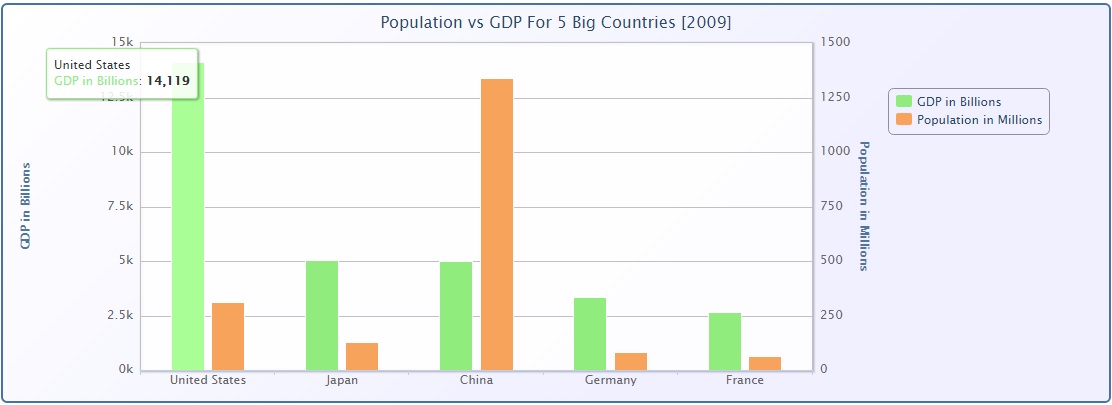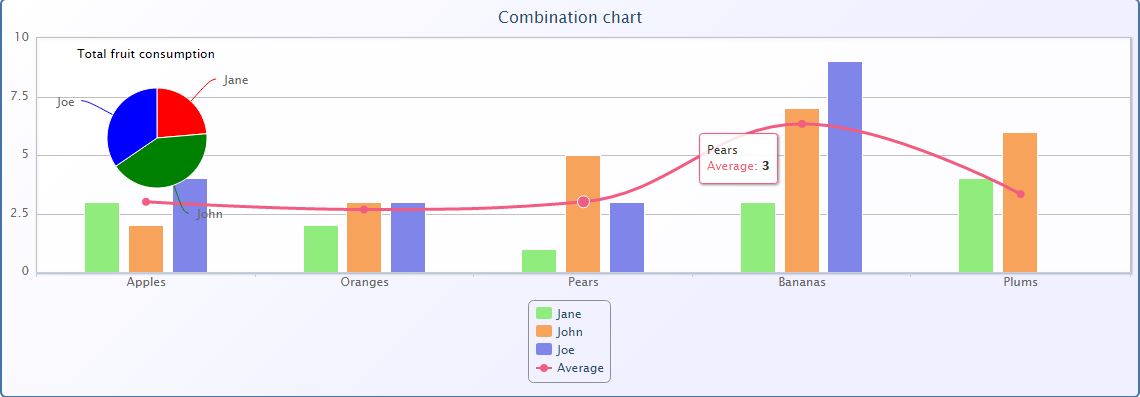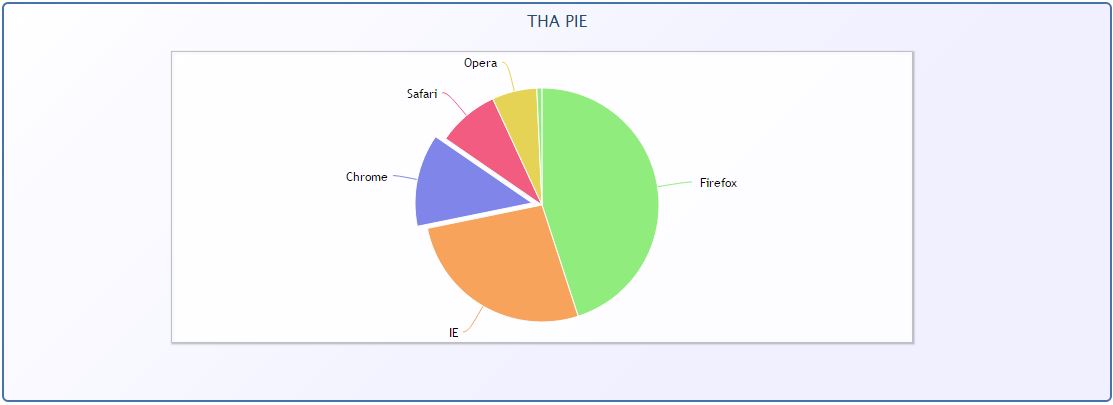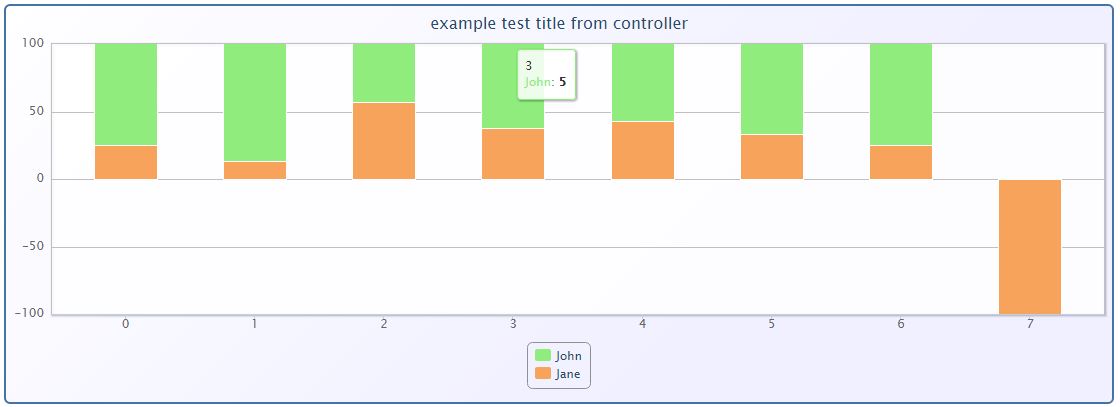lazy high chart
Updated at: February 23, 2017
@lazy_high_chart_github which is the implementation of js library high chart in rails
sample, what does it look like?
axes
controller
@chart = LazyHighCharts::HighChart.new('graph') do |f|
f.title(text: "Population vs GDP For 5 Big Countries [2009]")
f.xAxis(categories: ["United States", "Japan", "China", "Germany", "France"])
f.series(name: "GDP in Billions", yAxis: 0, data: [14119, 5068, 4985, 3339, 2656])
f.series(name: "Population in Millions", yAxis: 1, data: [310, 127, 1340, 81, 65])
f.yAxis [
{title: {text: "GDP in Billions", margin: 70} },
{title: {text: "Population in Millions"}, opposite: true},
]
f.legend(align: 'right', verticalAlign: 'top', y: 75, x: -50, layout: 'vertical')
f.chart({defaultSeriesType: "column"})
end
@chart_globals = LazyHighCharts::HighChartGlobals.new do |f|
f.global(useUTC: false)
f.chart(
backgroundColor: {
linearGradient: [0, 0, 500, 500],
stops: [
[0, "rgb(255, 255, 255)"],
[1, "rgb(240, 240, 255)"]
]
},
borderWidth: 2,
plotBackgroundColor: "rgba(255, 255, 255, .9)",
plotShadow: true,
plotBorderWidth: 1
)
f.lang(thousandsSep: ",")
f.colors(["#90ed7d", "#f7a35c", "#8085e9", "#f15c80", "#e4d354"])
end
view with helper method
<%= high_chart_globals(@chart_globals) %>
<%= high_chart("some_id", @chart) %> #same id will replace origin char

combination
@chart = LazyHighCharts::HighChart.new('graph') do |f|
f.title({ :text=>"Combination chart"})
f.options[:xAxis][:categories] = ['Apples', 'Oranges', 'Pears', 'Bananas', 'Plums']
f.labels(:items=>[:html=>"Total fruit consumption", :style=>{:left=>"40px", :top=>"8px", :color=>"black"} ])
f.series(:type=> 'column',:name=> 'Jane',:data=> [3, 2, 1, 3, 4])
f.series(:type=> 'column',:name=> 'John',:data=> [2, 3, 5, 7, 6])
f.series(:type=> 'column', :name=> 'Joe',:data=> [4, 3, 3, 9, 0])
f.series(:type=> 'spline',:name=> 'Average', :data=> [3, 2.67, 3, 6.33, 3.33])
f.series(:type=> 'pie',:name=> 'Total consumption',
:data=> [
{:name=> 'Jane', :y=> 13, :color=> 'red'},
{:name=> 'John', :y=> 23,:color=> 'green'},
{:name=> 'Joe', :y=> 19,:color=> 'blue'}
],
:center=> [100, 80], :size=> 100, :showInLegend=> false)
end

pie
@chart = LazyHighCharts::HighChart.new('pie') do |f|
f.chart({:defaultSeriesType=>"pie" , :margin=> [50, 200, 60, 170]} )
series = {
:type=> 'pie',
:name=> 'Browser share',
:data=> [
['Firefox', 45.0],
['IE', 26.8],
{
:name=> 'Chrome',
:y=> 12.8,
:sliced=> true,
:selected=> true
},
['Safari', 8.5],
['Opera', 6.2],
['Others', 0.7]
]
}
f.series(series)
f.options[:title][:text] = "THA PIE"
f.legend(:layout=> 'vertical',:style=> {:left=> 'auto', :bottom=> 'auto',:right=> '50px',:top=> '100px'})
f.plot_options(:pie=>{
:allowPointSelect=>true,
:cursor=>"pointer" ,
:dataLabels=>{
:enabled=>true,
:color=>"black",
:style=>{
:font=>"13px Trebuchet MS, Verdana, sans-serif"
}
}
})
end
<%= high_chart("my_id4", @chart) do |c| %>
<%= raw "options.tooltip.formatter = function() {return '<b> YUPI!! '+ this.point.name +'</b>: '+ this.y +' %';}" %>
<%= raw "options.plotOptions.pie.dataLabels.formatter = function() { if (this.y > 5) return this.point.name; }" %>
<% end %>

stack
@bar = LazyHighCharts::HighChart.new('column') do |f|
f.series(:name=>'John',:data=> [3, 20, 3, 5, 4, 10, 12 ])
f.series(:name=>'Jane',:data=>[1, 3, 4, 3, 3, 5, 4,-46] )
f.title({ :text=>"example test title from controller"})
### Options for Bar
### f.options[:chart][:defaultSeriesType] = "bar"
### f.plot_options({:series=>{:stacking=>"normal"}})
## or options for column
f.options[:chart][:defaultSeriesType] = "column"
f.plot_options({:column=>{:stacking=>"percent"}})
end
